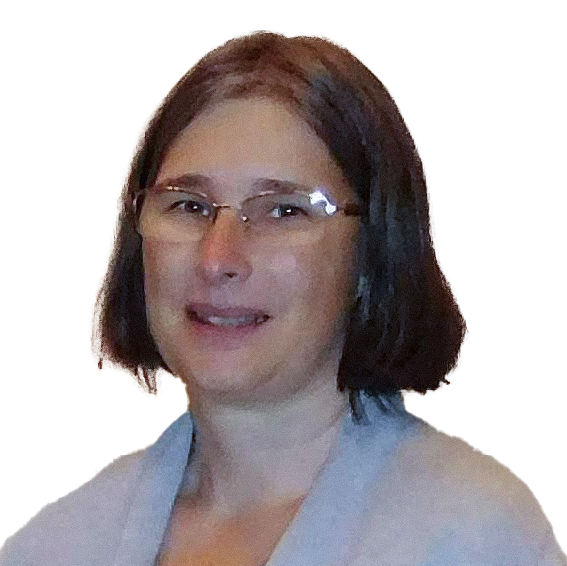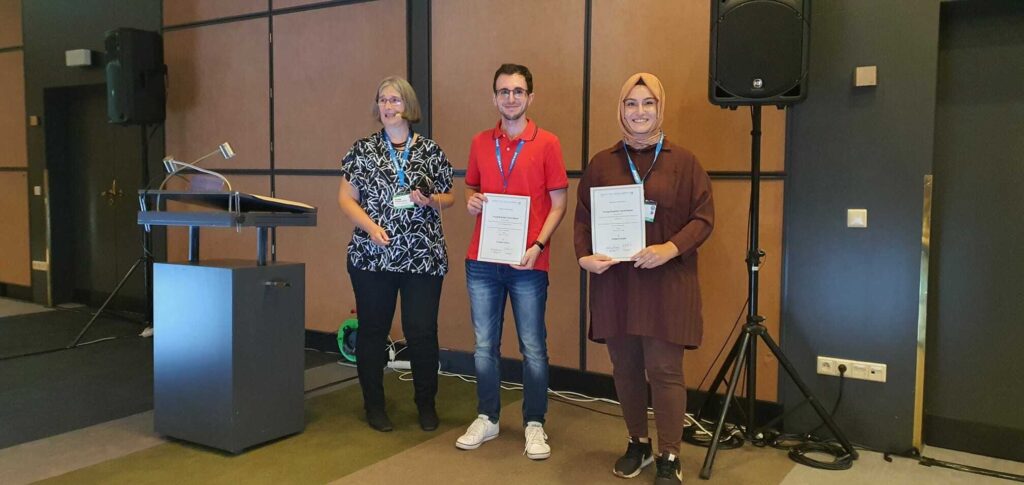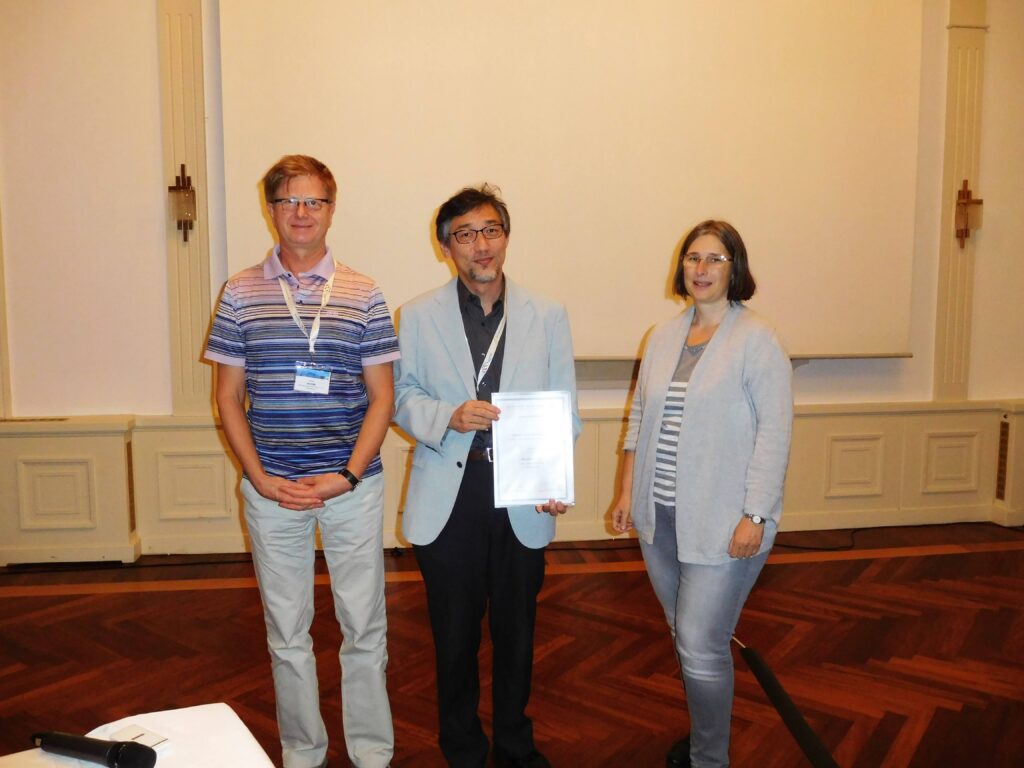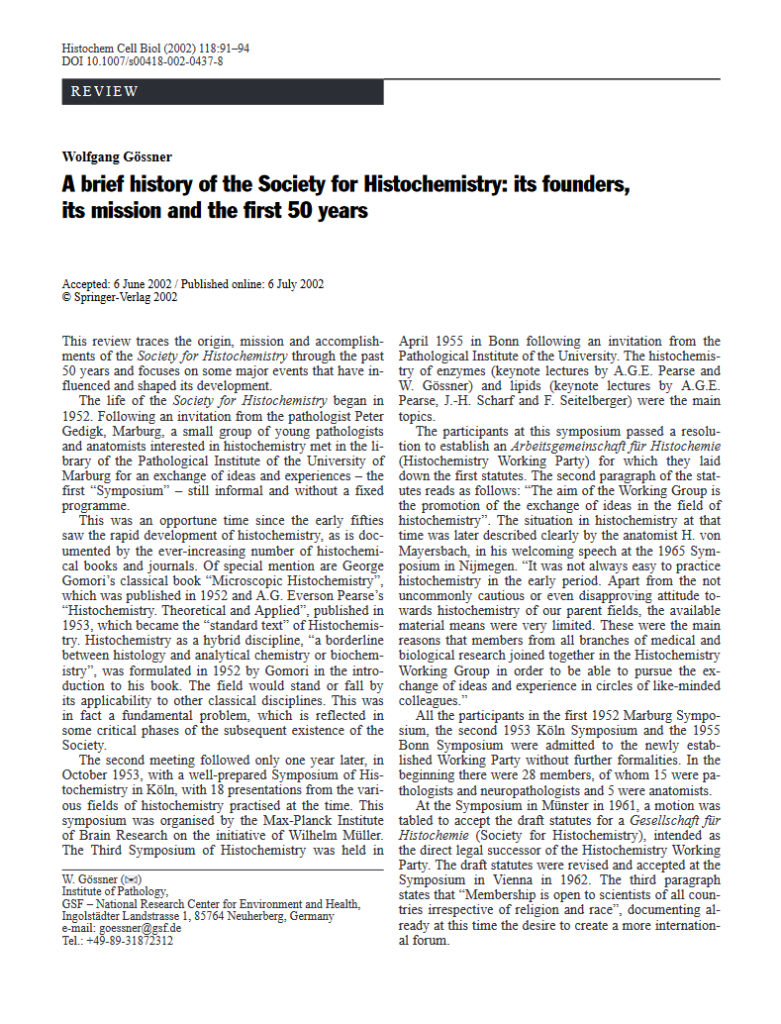Board

Prof. Dr. Klara Weipoltshammer, president
Centre for Anatomy and Cell Biology Medical University of Vienna Schwarzspanierstr. 17, Vienna, Austria

Prof. Dr. Marco Biggiogera, treasurer
University of Pavia Department of Biology and Biotechnology “Lazzaro Spallanzani” via Ferrata 9 27100 Pavia, Italy

Dr. Vlada Filimonenko
Institute of Molecular Genetics of the Czech Academy of Sciences Videnska 1083 CZ – 14220 Prague, Czech Republic

Prof. Dr. Pavel Hozák, secretary
Institute of Molecular Genetics of the Czech Academy of Sciences Videnska 1083 CZ – 14220 Prague, Czech Republic

Dr. Peter Vilmos
Biological Research Centre Szeged of the Hung. Acad. Sci. Szeged District, Csongrád, Hungary
Aims

Symposia
Advancement of histochemical methodology and new developments in the field by organizing highly-quality sessions at symposia where top scientists present their latest findings.
Support of young scientists
Stimulation of contacts between the novice and the more experienced young scientists on the one hand and the celebrities on the other.
Creation of a platform where the young scientists can present their data and expose themselves to the top players in the field.
Organization of workshops where specific methodology is exposed step by step to help young histochemists to apply valid methods and techniques.


Robert Feulgen Prize
Robert Feulgen Prize is awarded for an outstanding achievement in the field of histochemistry.
New approaches
Stimulation of the development of new approaches in histochemistry such as live cell cytochemistry, nanoparticles and single molecule cytochemistry
The Journal
Association with the top journal in the field of histochemistry “Histochemistry and Cell Biology“
BY-LAWS
| By-laws of the Society for Histochemistry (Gesellschaft für Histochemie) (translation of the revised version of 26 September 1977) |
| § 1 |
| a) The name of the Society is «Society for Histochemistry» (Gesellschaft für Histochemie). It has its registered office in Tübingen and has been officially registered at the «Vereinsregister». b) The Society for Histochemistry follows solely and forthrightly non-profit goals according to paragraph «tax benefit purposes» for payment regulation. The aim of the Society is the promotion of science and research, especially cytochemistry and histochemistry. The objectives of the bylaws will be primarily fulfilled by the realisation of scientific meetings and the publication of the proceedings of these symposia. c) The Society is autonomous; it does not primarily function for its own economic purposes. d) Resources of the Society may be used solely for statutory purposes. The members of the Society receive no allocation from finances of the Society. e) No person is allowed to benefit by expenditures that are not in accord with the aims of the corporate body or by inappropriately high reimbursement. |
| § 2 |
| Its purpose of the foundation is the promotion of science and research. In particular, the purpose of the statutes is accomplished by recruitment and dissemination of resources according to §58 nr. 1 AO for the Society for Histochemistry. The Society for Histochemistry is a Society of scientists of different disciplines. It is a non-profit organization that promotes scientific purposes only. Its aim is the exchange of ideas in the field of cyto- and histochemical science. To encourage this exchange it organizes symposia. |
| § 3 |
| Membership of the Society for Histochemistry is open to scientists of all countries irrespective of religion and race. |
| § 4 |
| a) Founding members of the Society are the members of the Society for Histochemistry who have already been registered as such. b) Membership can be obtained by scientists who have already manifested themselves by their research in the field of histochemistry or have a scientific interest in this field. Applications for membership must be submitted to the secretary of the Society. They must be accepted by the Board of the Society. c) Sponsors of the Society can be admitted as extraordinary members without vote. Their admission must be approved by the Board. d) Membership ends by resignation or death. Resignation is effective as of the end of the calendar year in which a written notice has been submitted to the secretary of the Society. e) Expulsion of a member can be decided by the Board, after hearing the person concerned, if this person has damaged the image of the Society or has failed to pay his contribution for more than 3 years in spite of reminders. Appeal against such expulsion is possible by means of a written petition to the Board. The decision on the petition will be made by the General Assembly by simple majority vote. There is no appeal against the decision of the General Assembly. |
| § 5 |
| The organs of the Society are a) the Board b) the General Assembly (Business Meeting) |
| § 6 |
| a) The Board consists of the President, the Secretary, the Treasurer and two more members. At least one member of the Board should be a national of a country other than the German Federal Republic. b) The Board can nominate regular members as associate members of the Board to perform certain tasks, or as deputies in accordance with § 30 BGB (German Code of Civil Law). The duties and rights of the associate members of the Board are determined by the General Assembly. c) Members of the Board are elected through secret ballot and by majority vote of the General Assembly. Election is for a 3 year term in general. In case of tie votes, the ballot is repaid. If again no candidate gets the majority vote, the tie is broken by lot. d) Suspension of a member of the Board is only possible by a decision of the General Assembly on account of important reasons as mentioned in § 27 (2) BGB (German Code of Civil Law). e) The Board elects one of its members as President. Secretary and Treasurer cannot be elected President during their term. The President chairs the Business Meeting of the General Assembly unless it has appointed another chairman, and reports on the activities during his term. f) The Secretary and the Treasurer are the legal representatives of the Society in litigation and for all other purposes in accordance with § 26 BGB. Each of them alone can represent the Society. The term of office of President, Secretary, Treasurer and of the other members of the Board is three years. Reelection of President, Secretary, Treasurer and of the other members of the Board is possible. g) The Secretary assists the President in managing the Society in accordance with the Board, and conducts the correspondence. He has to record and prepare the minutes of the sessions of the Board and the General Assembly. The minutes of the sessions of the General Assembly contain the decisions that have been made there. The Secretary submits the minutes to two members of the Society to have them confirmed. The minutes are then published on the Society internal website and brought to the notice of the members by an e-mail message. They can be published together with the information on the symposia. They must be submitted to the next regular Business Meeting of the General Assembly in the report by the Secretary. h) The Treasurer administers the assets of the Society. He administers the list of members and collects the membership dues. For internal matters, it is decided that in the absence the Treasurer’s representative is the Secretary. The balance sheet has to be submitted to the Business Meeting that relieves the Treasurer of his responsibility. The balance sheet is checked by one member who is not member of the Board. |
| § 7 |
| The General Assembly consists of the regular members. They meet during each regular symposium and, in addition, at request of the Board or a quarter of the regular members. The meeting is convened by the Secretary at a notice of at least 3 weeks announcing the agenda. Issues to be included in the agenda must be presented to the Secretary at least 4 weeks before the beginning of the symposium. Within the competence of the General Assembly are: 1) elections as requested by the bylaws 2) approval of balance sheets and business reports 3) discharge of the Board 4) decisions on proposals 5) decisions on changes in the bylaws or termination of the Society. The General Assembly is entitled to make decisions irrespective of the number of members present. The decisions of the Business Meeting shall be made by simple majority vote, unless otherwise decided. |
In case the General Assembly is not convened, the electronic vote may be used. The electronic voting shall be initiated by the electronic distribution of ballots and related materials for consideration, which will be executed by the Secretary. The deadline of receipt of such electronic votes cast shall be no less than two weeks from the date of mailing of the balloting materials.
| § 8 |
| All regular members have to pay a yearly contribution, due at the beginning of the year, after reminder by the Treasurer. The amount of membership dues is determined by the General Assembly on the proposal of the Board. |
| § 9 |
| In addition to financing office expenses the resources of the Society will be used to support the organization and presentation of the symposia. Eventual surpluses can be used only for purposes that correspond with the bylaws. |
| § 10 |
| Upon the dissolution of the foundation or upon the cessation of its tax-privileged purpose the assets of the foundation shall pass to the Society for Histochemistry e.v. (registered association), that shall use them exclusively and directly for non-profit purposes. §11 The Society administrates the Robert Feulgen Prize for Histochemistry that is put up and awarded every year. The presentation takes place during the opening session of the annual symposia. For the selection of the winner a committee is chosen from among the members. The prize is financed by gifts from the members and surpluses of the resources of the Society. Details are regulated by the «Rules for the Awarding of the Robert Feulgen Prize of the «Gesellschaft für Histochemie» (Society for Histochemistry). |
| §12 |
| The bylaws can be supplemented with rules. The provisions of the rules should comply with the bylaws. The rules are determined by the General Assembly by simple majority vote. Changes in the rules that can be submitted by the Board or by a group of at least 10 members, are decided by the General Assembly by simple majority vote. |
| §13 |
| Changing the bylaws is only possible by a decision of the General Assembly by 2/3 of the recorded votes. Changes in the bylaws must be effectuated according to the «Merkblatt für eingetragene Vereine» and must be registered with the proper authorities in the official way. |
| §14 |
| Termination of the Society can only be decided by the General Assembly by 3/4 of the members who are present and have the right to vote. Upon termination of the Society or upon the cessation of its tax-privileged purpose the remaining assets shall pass to a corporation under public law or another tax-privileged corporation that shall use them for scientific non-profit purposes. |
| §15 |
| These bylaws were made up on March 17th 1973 on the occasion of the Business Meeting of the General Assembly in Frankfurt a.M. and enlarged on the occasion of the Business Meeting in Gent (Belgium) on September 26th 1977. These bylaws were updated on August 20th 2015 on the occasion of the Business Meeting of the General Assembly in Vienna. (By right of German law, the German version of the bylaws is binding) Rules of the Society for Histochemistry (Gesellschaft für Histochemie e.V.) (version of August 20, 2015) |
I.
Members of the Society who have particular scientific specialties can form sections within the Society. These sections are entitled to represent their interests – after agreement with the Board – independently outside the Society, to arrange manifestations of their specialty within the symposia of the Society and to organize separate workshops. The founding and the termination of such sections must be approved by the General Assembly. These sections do not have an independent budget. The members of these sections elect from among themselves for a 3 year term, a spokesman and his substitute, who have to be confirmed by the Board of the Society. Reelection is possible. The spokesmen of the sections will report on their activities to the General Assembly. The spokesmen of the sections or their substitutes should be nominated for the elections of the Board.
II.
The Society for Histochemistry (Gesellschaft für Histochemie) is a member of the «International Federation of Societies for Histochemistry and Cytochemistry». At the business meetings of this Federation, the Society is represented by 2 members of the Board, usually by the President and the Secretary. If the agenda of such a business meeting concerns matters of importance to the Society, the representatives must act in accordance with the other members of the Board, whose opinion should be asked either in writing or orally. The amount of the membership dues of the International Federation is submitted by the Board and decided upon by the General Assembly.
III.
These rules supplement the bylaws. Changes can be submitted by the Board or by a group of at least ten members and decided upon by the General Assembly by simple majority vote. If any discrepancy occurs between bylaws and rules – e.g. caused by a change of the rules – then the rules are override by the bylaws until the discrepancy has been solved by changing the rules. (By right of German law, the German version of the rules is binding)
